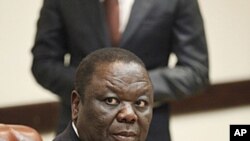Zimbabwe’s Prime Minister Morgan Tsvangirai has condemned the recent allocation of two new radio licenses, both of which went to operators with records of partisan reporting. The 2008 agreement that brought the inclusive government to power said the airwaves should be opened up beyond media that support President Robert Mugabe.
Addressing parliament Thursday, Prime Minister Tsvangirai spoke of Zimbabwe’s mixed progress during this, the third year of the inclusive government which includes his Movement for Democratic Change party and President Mugabe’s ZANU-PF party.
In particular, Tsvangirai criticized the awarding of broadcast licenses to two new operators which have strong links to ZANU-PF. The Broadcast Authority of Zimbabwe was set up without reference to the MDC, and several political analysts say this is a contravention of the global political agreement, or GPA.
The only electronic media based inside Zimbabwe is the state broadcaster, the Zimbabwe Broadcasting Corporation, ZBC, which has four radio and two television stations. All are partisan and support ZANU-PF, according to the Media Monitoring Project of Zimbabwe.
The broadcasting authority, known as BAZ, recently reviewed applications from 13 hopefuls for two new national radio stations.
Without giving any reasons, it awarded one to a new division of Zimbabwe Newspapers, which publishes dailies that make no secret of their support for ZANU-PF. The other license went to a group led by a former ZBC employee who also openly supports President Mugabe's party.
"To all intents and purposes, this has become a national joke. One of the key reforms, as envisaged in the GPA and as agreed by the principals, is the issue of comprehensive media reforms, which includes introduction of more and diverse players in both the print and electronic media as well as the immediate cessation of hate speech. To date, there has been outright arrogance and intransigence from the responsible minister and his officials," Tsvangirai noted.
Tsvangirai said the BAZ had been set up illegally, in regards to the media reforms spelled out in the GPA. “The current illegally constituted BAZ board is now adjudicating and approving broadcasting licenses unlawfully. The current BAZ board needs to be directed to stop operating immediately and the licenses it has dished out immediately revoked," he stated.
There are several other public boards involved in Zimbabwe's media, and Tsvangirai called upon the ZANU-PF information minister Webster Shamu to reconstitute those boards according to agreements already made with Mr Mugabe last year.
"The editorial policies of the state newspapers and the state broadcaster has remained partisan and unreformed, and the media field remains dominated by the same partisan state players. The minister of media, information and publicity should finalize appointments of all the media boards,” Tsvangirai said.
Since the inclusive government came to power nearly three years ago three new privately-owned newspapers have begun publishing. One has since closed down for financial reasons, and the other two say they are doing well in terms of both circulation and advertising.
Tsvangirai also said that the 2012 budget depended heavily on revenues from diamond companies in eastern Zimbabwe, now cleared by the international regulator to export rough stones.
He said he wanted to see more transparency in sales from the diamond mines which are half owned by the government.
The prime minister said also said the pace political reform had been disappointing in 2011, and that political stability was the key to growth and ensuring free, fair and legitimate elections.
No ZANU-PF legislators were present Thursday for Tsvangirai's speech, his end-of-year address to parliament.













